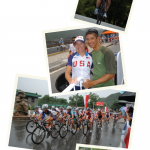
My patient was a crew member on a sailboat and planning to compete in the Olympics in Sydney in just 12 weeks.
Tero Hakala/shutterstock.com
Never underestimate the power of dreams and the influence of the human spirit. … The potential for greatness lives within each of us. —Wilma Rudolph, U.S. Olympic sprinter & winner of three gold medals
From Spinnaker to Wheelchair
It can be an unnerving experience when the patient you are about to see is young and wheelchair bound. Because my office is situated just across the hall from our orthopedic colleagues, I often assume that these patients have been wheeled over in error. Although rheumatologic illnesses can rob an individual of their strength and mobility, thankfully, better therapies and advances in musculoskeletal care make this a rare event. Brett, however, had followed the correct coordinates to appear at my doorstep that Friday morning, hours before the start of the Memorial Day weekend, heralding the unofficial start of summer in the Northeast.
The reason for Brett’s immobility became obvious fairly quickly. He had developed an aggressive polyarthritis over the course of just a few weeks, limiting his ability to walk or move about freely. Several fingers and toes were beefy, thick and swollen, confirming why the colloquial term for dactylitis, sausage swelling, is apt. After Brett was told by a local doctor that his failure to improve following a course of oral antibiotics left him with few therapeutic options, except for using more potent intravenous antibiotics, his girlfriend had driven him from his home in Newport, R.I., north to Boston.
Newport is a lovely coastal community and a popular tourist destination renowned for its magnificent mansions that served as the summer “cottages” for the wealthiest of the wealthy, the captains of Wall Street and the industrialists who built America. This is where the Astors, the Vanderbilts, the Morgans and other families of their ilk gathered each summer to relax and play. For many years, its coastal waters served as the site for the America’s Cup sailing races, arguably the most patrician of all sporting events in America.
Brett’s look of anguish and despair, the tears welling in his eyes, were understandable. He was in considerable pain. He couldn’t move. He could barely look after himself. He needed a bedpan. Who wouldn’t be terrified by this whirlwind sequence of events that had abruptly transformed this healthy young guy into an invalid?


